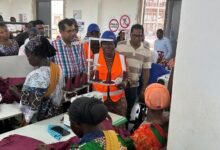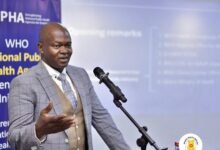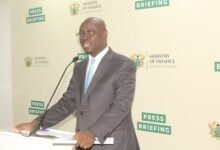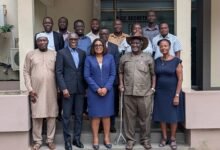Regional workshop on flood, drought mitigation ends

A regional workshop to promote inter-agency collaboration to aid the country’s efforts to reduce floods and droughts risk as well as its economic and social impact has been held in Accra.
It is focused on creating awareness about a framework, developed by the World Bank and other partners, to enable effective floods and drought management.
Dubbed, ‘EPIC Response: Innovative Governance for Flood and Drought Risk Management,’ the framework identifies the roles of different government agencies in managing floods and drought risks and highlights where and how the agencies need to collaborate.
Opening the event yesterday, Ms Cecilia AbenaDapaah, Minister of Sanitation and Water Resources, in a speech read on her behalf, said the emergence of floods and droughts had come to stay due to climate change and human activities.
Within the past 10 years, she noted that Ghana had recorded floods across the various regions with the northern parts being the hardest-hit while countries in Sub-Saharan Africa faced drought challenges.
She said the phenomenon had resulted in the pollution of water sources, destruction of farmlands, properties, infrastructure including roads and bridges, loss of human lives and livelihoods, among others.
To mitigate the associated risks and ensure effective flood and drought management, she stated that there was the need for innovative solutions at the local, national and trans-boundary levels.
The minister reiterated Ghana’s readiness to take advantage of the framework to identify best tools and intensify collaboration between the various agencies to effectively manage the risks of floods and droughts.
Operations Manager of the World Bank, MsAgataPawlowska, noted that, the impact of floods and droughts was far reaching and inter-generational.
She said the associated risks and impacts keeps growing each year hence, the need for integration of governments’ responses towards the phenomenon for effective management.
She explained that comprehensive societal approaches involving agencies, groups, individuals were critical in developing innovative solutions for increased response.
Acting Executive Secretary of the Water Resources Commission, AdwoaPaintsil said, although government had put in place measures to deal with floods and droughts, mitigating its impacts would be a consequence of shared responsibility.
“We cannot leave any group or person out of the measures to reduce the risk and impact of floods and droughts.
“It’s a shared responsibility. We must not build in waterways, dispose of waste in drains and rivers and avoid other human activities that increases our risk to flood and droughts,” she added.
Nathan Engle, Senior Climate Change Specialist at the World Bank, said over the last two decades, at least 1.65 billion people had been affected by floods while 1.43 billion others suffered from drought.
The economic costs, he noted, had been staggering and social costs even higher as the poor and marginalised were disproportionately affected.
The EPIC Response Framework, he stated, was focused on enabling national frameworks including strategic plans and facilitating a whole of society approach.
He stated that it would ensure the planning of flood and drought risk mitigation and contingency planning and investment in healthy watersheds and water resources infrastructure.
Mr Engle said the framework would help to control water allocation and groundwater management as well as floodplain management.
BY CLAUDE NYARKO ADAMS







